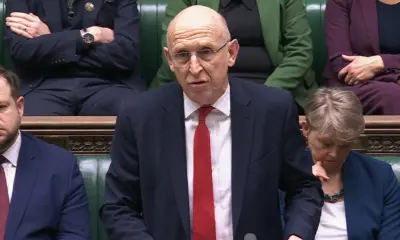News
UK Man Sentenced for Attempting to Share Former Defence Minister’s Details with Suspected Russian Agents

A British man has been sentenced to prison after attempting to provide personal information about former Defence Minister Grant Shapps to individuals he believed were Russian intelligence officers. The case has raised concerns about espionage attempts targeting senior government officials and the growing risks of foreign interference.
Howard Phillips, 46, was jailed on Friday for assisting a foreign intelligence service after prosecutors revealed that he offered to sell Shapps’ private details—including his home address and phone number—to two people he thought were Russian operatives. The individuals, who went by the names “Sasha” and “Dima,” were in fact undercover British security officers conducting a counterintelligence operation.
Prosecutors said Phillips contacted the supposed agents earlier this year, claiming to have access to sensitive information about several UK government figures. He allegedly portrayed himself as a sympathizer of Russia and offered to cooperate in exchange for money. Authorities said his actions were motivated by both financial desperation and anti-government sentiment.
The court heard that Phillips initially made contact through an encrypted messaging app, where he offered to share details about Grant Shapps, who was serving as Defence Minister at the time. He also suggested he could provide information about parliamentary security procedures and possible vulnerabilities in the government’s communications systems.
Unbeknownst to him, his communications were being monitored as part of an ongoing operation by British counterintelligence agencies. Investigators moved swiftly to arrest Phillips before any classified material was disclosed. A search of his home uncovered multiple electronic devices containing messages, drafts, and notes related to his interactions with the undercover officers.
During sentencing at London’s Old Bailey, Judge Caroline Edwards described Phillips’ actions as a “reckless and deliberate attempt to endanger national security.” She noted that while no actual state secrets were shared, the intent behind his behavior posed a serious threat. “Your willingness to collaborate with individuals you believed to be agents of a hostile foreign power represents a grave breach of trust and duty as a citizen,” the judge said.
In mitigation, Phillips’ defense lawyer argued that he had no formal access to government secrets and had acted out of personal frustration and poor judgment rather than a calculated effort to spy. However, the prosecution emphasized that his attempt to trade personal information about a sitting cabinet minister demonstrated clear intent to aid a foreign power.
Grant Shapps, who is now serving as the UK’s Defence Secretary, was informed of the case during the investigation. A government spokesperson said the matter was handled swiftly and that there had been no breach of national security. “The safety of government officials and the protection of national information remain a top priority,” the spokesperson said.
The case comes amid heightened concerns over espionage activities involving Russia and other foreign actors in Europe. British intelligence agencies have repeatedly warned of attempts to infiltrate political institutions and recruit individuals with access to sensitive data.
Phillips was sentenced to six years in prison, with the judge noting that deterrence was an important factor in the punishment. His case adds to a growing list of prosecutions under the UK’s expanded national security laws aimed at combating foreign influence and information leaks.






















